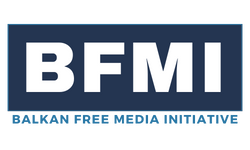Global Brands Unwittingly Fund Pro-Kremlin Disinformation in the Balkans, New Study Shows
Advertising revenues from major North American and European brands are funding and legitimising media outlets that disseminate disinformation on the Russia-Ukraine conflict, Kosovo and other divisive issues in the Balkans, according to a report published today by the Balkan Free Media Initiative (BFMI) and Center for Research, Transparency and Accountability (CRTA).
Titled ‘Defunding Disinformation in the Balkans: How International Brands Support Russia’s Agenda’, the report finds that notable brands from Germany, US, UK, France and other countries are channelling millions of euros in advertising to media outlets in Serbia and Bulgaria that spread pro-Kremlin disinformation, denying the Bucha massacre, likening NATO to an ‘apocalyptic group of anti-Russian crusaders’ and attacking the European Union.
Amid growing concerns over the impact of disinformation on security and democracy in the region, the report issues a stark warning: global brands and advertising companies are inadvertently bolstering Russian influence and exacerbating the fragile political situation in the region through their current advertising practices. This represents a growing risk for brand reputation.
Brands advertising in outlets mentioned in the report include Lidl, Delhaize Group, Procter & Gamble, Coca-Cola, Bosch and Amazon. Advertising technology providers Google and Criteo are found to connect brands with online news portals spreading disinformation in the Balkans.
Peter Horrocks, Board Member of BFMI, noted: "Advertising from major international brands plays a significant role in sustaining media in Southeast Europe and the Balkans. Unfortunately, some of these outlets regularly promote disinformation. Our focus today is to highlight how current funding policies inadvertently supports the spread of Russian propaganda in the Balkans; a fact largely unknown to these brands.”
Rasa Nedeljkov, Program Director at CRTA, stated: “The anti-West, pro-Russia and pro-government propaganda machine in Serbia is largely funded and, therefore, legitimised by Western companies. North American and European nations, as well as the EU, must take action now to stop this – otherwise they will continue to foster the Russian playbook in Serbia that pushes our society away from democracy and European values straight into authoritarian rule.”
Antoinette Nikolova, Director of BFMI, emphasized the urgency of the matter: “The surge of disinformation in the Balkans is stoking ethnic conflict, eroding democracy, and driving the region away from the EU and into Putin’s hands. Global brands, and the middlemen involved in the advertising process, have an important responsibility to ensure their investments do not contribute to the further erosion of media freedom and stability in the Balkans.”
The report calls on policymakers, civil society and the private sector to take concrete steps to ensure corporate advertising strategies strengthen independent media and democracy in the region.
Note to editors:
● BFMI is a Brussels-based, independent civil society organisation addressing the gap in accountability and advocacy on media freedom issues in the Balkans.
● CRTA is a Belgrade-based independent, non-partisan civil society organisation committed to developing democratic culture and civic activism in Serbia. CRTA is leading the largest domestic election observation mission in Serbia.
● The report examines Serbia and Bulgaria as case studies, two states at a critical junction between European democracy and authoritarianism in the Balkans. In this multi-ethnic region, pro-Kremlin disinformation exacerbates ethnic discord that could lead to devastating regional consequences.
● According to a study by the European Parliament, Serbia serves as a “launchpad for Russian disinformation operations in the Western Balkans.” In 2023, the country saw the largest decline in media freedom in Europe, according to Reporters Without Borders.
● Serbian President Aleksandar Vučić has been criticised by media freedom organisations for utilising the media regulator and state-owned telecommunications provider Telekom Srbija to stifle free press and opposition. Outlets sympathetic to Vučić dominate the Serbian information environment. Serbia will hold parliamentary elections on 17 December 2023.
● Bulgaria has been described by the International Press Institute as the “weak link in Europe’s fight against Russian disinformation.” Disinformation in the country largely spreads online, through news websites and social media.

